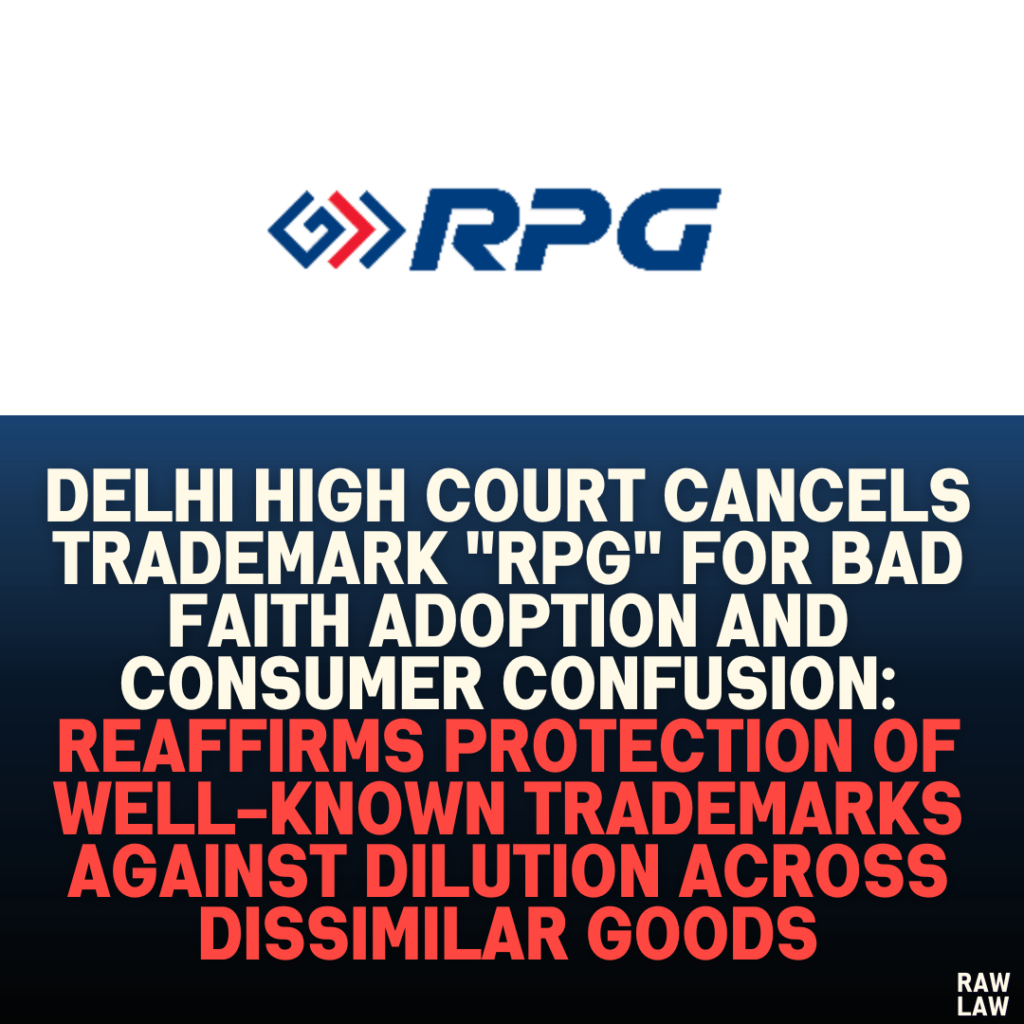Court’s Decision
The Delhi High Court held that the respondent’s trademark registration (No. 2778255 under Class 23) for the mark “RPG” was invalid. It ordered its removal from the Trademark Register due to bad faith adoption and the likelihood of consumer confusion. The court directed the Trade Marks Registry to issue a notification confirming the cancellation. The judgment reaffirmed that well-known trademarks are protected against dilution and misuse, even for dissimilar goods.
Facts of the Case
- The Petitioner’s Trademark History:
- The petitioner, a large business conglomerate operating since 1979, uses “RPG” as a key identifier. The acronym originates from its founder’s initials, R.P. Goenka.
- Over time, “RPG” became synonymous with the petitioner’s diverse business activities, which span infrastructure, IT, energy, and more. The petitioner registered multiple trademarks for “RPG,” including in Class 25 (clothing, footwear, and headgear) and holds copyrights since 1988.
- Discovery of Respondent’s Trademark:
- In 2018, while conducting a trademark search, the petitioner discovered the respondent’s registration for the mark “RPG” in Class 23 (polyester fiber). This mark was identical to the petitioner’s well-known mark.
- The petitioner claimed that the respondent’s registration infringed upon its prior rights and diluted the distinctiveness of the “RPG” mark.
- Cease and Desist Notice:
- A cease-and-desist notice was issued to the respondent in 2017, but no reply was received. The petitioner believed the matter was resolved until it discovered the impugned registration in 2018.
- Nature of the Dispute:
- The petitioner alleged that the respondent’s mark was a dishonest replication of its own well-known mark, intended to create consumer confusion.
Issues Before the Court
- Was the respondent’s adoption of the “RPG” mark made in bad faith?
- Did the respondent’s use of the mark dilute the petitioner’s trademark rights?
- Does the petitioner’s trademark qualify as a well-known mark under the Trade Marks Act, 1999?
- Should the respondent’s trademark registration be canceled?
Petitioner’s Arguments
- Well-Known Status of “RPG”:
- The petitioner argued that “RPG” is a well-known trademark under Section 2(1)(zg) of the Trade Marks Act, 1999, as held by the Bombay High Court in an earlier case.
- It presented evidence of extensive use, goodwill, and recognition since 1979.
- Bad Faith and Fraud:
- The respondent’s registration claimed use since 2011, but no evidence supported this date. Instead, the earliest documented use dated to 2013. This false claim constituted fraud on the Registrar.
- Dilution and Consumer Confusion:
- By using the same mark, the respondent diluted the petitioner’s distinctiveness, leading to a high likelihood of confusion among consumers.
- Violations of Trademark Law:
- The registration violated Sections 11 and 18 of the Trade Marks Act, 1999, as it unfairly leveraged the goodwill of the petitioner’s mark.
Respondent’s Arguments
- Honest Adoption:
- The respondent contended that its “RPG” mark derived from its founder’s initials, Rajendra Prasad Gupta, and was adopted in good faith.
- Distinct Goods:
- It claimed that the petitioner’s mark (used for Class 25: clothing) and the respondent’s mark (used for Class 23: polyester fiber) pertain to entirely different goods, eliminating the risk of confusion.
- Prior Use:
- The respondent claimed it had used the “RPG” mark openly and continuously since 2011 without market complaints or confusion.
- Petitioner’s Delay:
- The respondent argued that the petitioner’s trademark registration in Class 25 was obtained only in 2018, after the respondent’s registration.
Court’s Analysis
1. Recognition of “RPG” as a Well-Known Trademark:
- The court recognized “RPG” as a well-known trademark based on its widespread use and reputation across industries.
- It emphasized that well-known marks deserve protection even for unrelated goods.
2. Bad Faith Adoption:
- The respondent’s adoption of “RPG” was found to be dishonest and aimed at capitalizing on the petitioner’s goodwill.
- The court noted that the respondent must have been aware of the petitioner’s extensive use and reputation, given the long history of the mark.
3. Likelihood of Confusion:
- The court determined that the similarity between the marks would likely mislead consumers into believing that the respondent’s goods were associated with the petitioner.
- Even though the goods were classified differently, the association created by the identical mark posed a significant risk of confusion.
4. Legal Precedents:
- The court cited key judgments, including Daimler Benz v. Hydo Hindustan and Sony Kabushiki Kaisha v. Mahaluxmi Textile Mills, to establish that well-known trademarks warrant strong protection against dilution, regardless of the goods’ similarity.
5. Principle of Honest Adoption:
- Honest adoption requires a lack of knowledge about prior use. The respondent’s claim of deriving the mark from its founder’s initials was rejected as unsupported and implausible.
Conclusion
- The court canceled the respondent’s trademark registration for “RPG.”
- It directed the Trade Marks Registry to notify the cancellation and expunge the mark from its records.
- The judgment underscored that trademarks with extensive goodwill and recognition, like “RPG,” must be protected against misuse, regardless of the goods involved.
Implications
This judgment reinforces:
- The robust protection granted to well-known trademarks under Indian law.
- The importance of honest adoption and the consequences of bad faith registration.
- The need to safeguard trademarks against dilution, even for unrelated goods, to preserve their distinctiveness and goodwill.




Pingback: Bombay High Court: Section 34 Petition Not Time-Barred Due to Improper Service of Signed Arbitral Award, Delays Limitation Period Commencement Under Arbitration Act - Raw Law